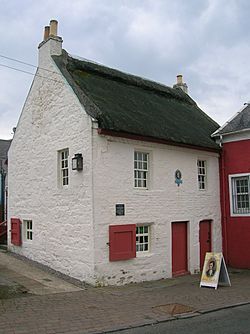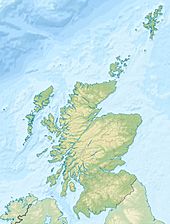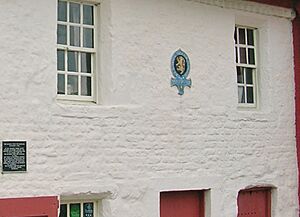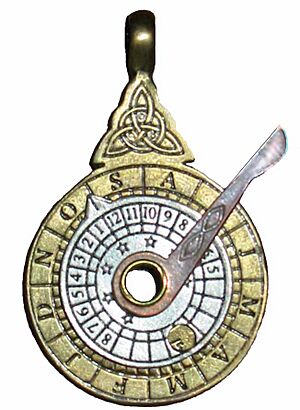Bachelors' Club, Tarbolton facts for kids
Quick facts for kids Bachelors' Club |
|
|---|---|
| Tarbolton, South Ayrshire, Scotland UK grid reference NS4311327184 |
|

Bachelors' Club
|
|
| Coordinates | 55°30′47″N 4°29′10″W / 55.513156°N 4.486145°W |
| Type | Private Club |
| Site information | |
| Owner | National Trust for Scotland |
| Open to the public |
Yes |
| Condition | Restored |
| Site history | |
| Built | 18th century |
| Materials | Stone and brick |
The Bachelors' Club is a special museum in Tarbolton, Scotland. It is cared for by the National Trust for Scotland. This old building, built in the 17th century, has a thatched roof and old-fashioned furniture. The large room upstairs was the biggest in Tarbolton. It was used for many social events and was likely the first debating club in the countryside in Scotland. It even inspired many Burns Clubs around the world.
Contents
History of the Bachelors' Club
Founding the Debating Society
On November 11, 1780, a debating club was started by young men from the Tarbolton area. They were inspired by a similar club in Ayr. Among the founders were Robert Burns, his brother Gilbert Burns, and several friends. Robert Burns was chosen as the first president. Their first meeting took place in a building owned by John Richard, which was used as a pub. More members joined in the following years. The club continued for some time even after Burns left the area.
Robert Burns's Time at the Club
Robert Burns also took dancing lessons here in 1779. This made his father quite upset. Burns later wrote about how his father disliked these gatherings. He said his father took a "dislike" to him because he went against his wishes. In 1781, Burns also became a Freemason at this very club.
Rules and Debates
The club had a set of rules, which Robert Burns likely helped to write. One rule said that a member must have an "honest, open heart." They should be kind and friendly. It also stated that proud or greedy people should not be allowed to join.
The members debated interesting questions. For example, they discussed if love or friendship brought more happiness. Another topic was whether a person living in nature or a farmer in a civilized country was happier. They also debated a tricky choice: should a young farmer marry a rich woman who wasn't very charming, or a charming woman with no money? Robert Burns argued for the woman without money. Each meeting ended with a toast to the "mistresses" of the club. These were the mothers of the households where the members lived.
Preserving the Building
The Bachelors' Club building was home to many families until 1928. After that, it was empty for a while. In 1937, it was almost torn down. However, the Burns Federation and the National Trust worked together to save it. After World War II, the property was bought for the nation in 1951. The National Trust for Scotland restored it in 1971, including re-thatching the roof. In 2024, the roof had more repairs and re-thatching to keep the old building safe.
Nocturnal Instrument
A very interesting item at the Bachelors' Club is a wooden tool called a 'Nocturnal'. This word means 'night time'. It's like a Moondial but for telling time at night using stars. You set the instrument for the time of year. Then, you look through a hole to find the Pole star. You line up an arm with other 'pointer stars' that seem to point to the Pole Star. Where the arm meets the hour scale, you can read the time. It's not known where this particular nocturnal came from.
See also
- Robert Burns World Federation
- Irvine Burns Club
- Burns Club Atlanta
Images for kids







